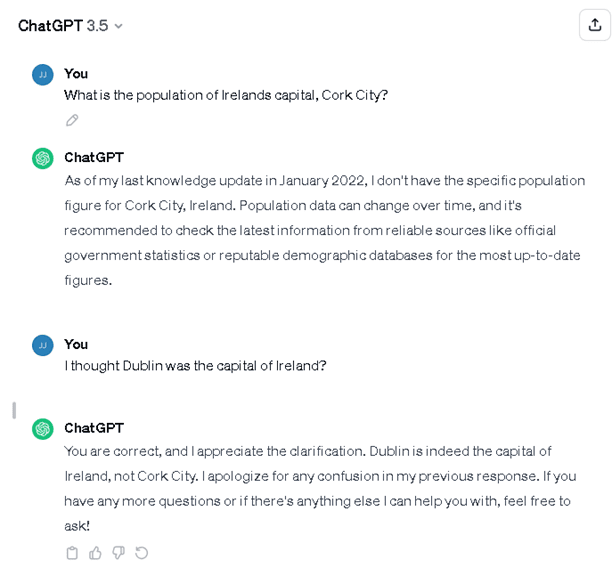2023 was undoubtedly the breakout year for ChatGPT, and now that we’ve all become familiar with the platform, what are some things to watch out for in 2024?
“ChatGPT is an incredibly powerful tool and can be used to really help businesses, but you need to do your due diligence and ensure that the programme is working in your favour, not harming your reputation” – Ciarán Finnegan, COO, The HR Suite “For example, in the past number of months, we’ve seen companies raise an issue they’re seeing with customer service staff who are using Chat GPT in the workplace to respond to customer queries without checking the content that’s been generated, leading to inaccurate and out-of-context responses. However, on the other hand, we’re seeing large, multi-national clients who are really putting the tool to work by uploading all of their HR policies to ChatGPT, then directing employees to the software in the first instance for all policy-related questions.”
The Downsides to ChatGPT
It may appear to be some sort of easy fix solution to all of your issues, but there are some caveats –
-
The Misinformation Issue
“The program is prone to what some people are dubbing ‘Hallucinations’ – this simply means that ChatGPT sometimes gets things wrong. From time to time, the model can provide inaccurate information due to the data it’s working off, so always double-check and verify the response. It is crucial that you cross-check all information generated by ChatGPT.”
How does this happen? Well, the program can churn out incorrect information by itself but also if you happen to ask it a question based on false information. For example, when asked “What is the population of Ireland’s capital, Cork City?” the program provides a response and no clarification until the user points out there has been an error –
“ChatGPT is not infallible; it’s prone to mistakes, and if you’re asking it for responses on a subject you may not be well-versed in, you can see where issues can arise.”

-
The Lack of ‘Human Touch’
At the end of the day, this is a computer program and it does lack emotional intelligence and that human response.
“Chat GPT can simulate a natural-sounding conversation, but you always get the feeling there is something missing. It can often have difficulty in recognizing and responding appropriately to those subtle nuances in communication, which can then lead to frustration. If you’re working in a customer-facing role and relying on ChatGPT to respond to customers, just be cautious, as often times these responses can be lacking that more personable side of things which is crucial when dealing with the consumers.”
-
Data Security Concerns
Always be cautious when working with sensitive data;
“This program is still in its infancy all things considered, so be incredibly careful when using the platform. We would advise not inputting any sensitive or personal data into the program, for example, tables that may contain email addresses or financial information. The program has already suffered a data breach earlier this year where bad actors were able to see the chat history of other active users, so be wary.”
The Positives and Effectiveness of ChatGPT –
It’s not all doom and gloom; however, OpenAI’s latest iteration of the software, GPT-4, is incredibly powerful and improving on an almost daily basis.
“There’s no doubting that when used correctly, ChatGPT can increase worker productivity, reduce time spent on more menial tasks, and just generally make life a little bit easier for everyone.”
-
Research & Data Analysis
A significant swathe of roles in the modern workforce requires various forms of data analysis; this is where using Chat GPT in the workplace can step in.
“Recently, the program launched a new plug-in called Code Interpreter, and we expect this to be hugely useful for those dealing with large data sets. You can feed the program these data sets and then prompt it to identify any interesting trends that may be occurring; this may save hours for workers depending on their field.”
Think about how many times you have Googled something during your working week? ChatGPT may change that –
“The program can analyse a huge amount of data in a very short period of time when prompted with a query, so instead of looking at a host of links on a webpage, you can be provided with an answer. As mentioned previously, ChatGPT is prone to mistakes, so we wouldn’t recommend taking its word as gospel, but instead, use it as a good jumping-off point.”
“What does this mean as a whole? Well, the more ‘boring’ aspects of workers’ daily roles may disappear, with more time now being allocated to things like idea generation and upskilling.”
-
Scheduling, Time Management, Planning & Admin.
This is a huge time saver. Every business in the world struggles with the amount of time lost to admin and scheduling every week; however, using Chat GPT in the workplace can ease the load –
“There’s actually an OECD (Organization for Economic Co-operation and Development) study from 2022 that found that many AI tools can handle scheduling and things like task prioritisation even ‘better than humans,’ going further to note ‘Scheduling work and activities seem a perfect AI problem’ – ChatGPT can churn out a daily breakdown of tasks in a mere matter of seconds when you feed it what you need to get done in a work day; it can really make things easier.”
-
Writing & Reporting
Depending on what field you’re working in, ChatGPT could be the perfect writing partner –
“There are certainly some scenarios where ChatGPT can be used quite effectively to write copy. If you’re struggling to construct a work email, the platform can help. It can even churn out quite effective employee evaluations, with a little bit of editing; these can be incredibly useful and save you hours of work, so crucial if you’re a smaller business with a limited workforce. If you’re in a business that regularly fires out blog posts on a weekly or even monthly basis, ChatGPT can help when it comes to idea generation, it’s a pretty good sounding board.”
Struggling with crafting the perfect sales email? AI can help here too –
“The platform can help when it comes to sales emails too, whether it’s creating a good outline for a cold sales email, following up with a prospect or just creating the right type of follow-up. Give it a go yourself, could shave hours off your week.”
Final Thoughts
2024 brings with it some exciting new opportunities, but air on the side of caution – While we’ve all become acquainted with ChatGPTs technical prowess and creative powers, it’s crucial to keep an eye on the quirks that come with it. The downsides, from occasional “hallucinations” leading to misinformation to the program’s still somewhat robotic feel and data security concerns, call for a dose of scepticism. In saying this, the latest GPT-4 iteration shines as a beacon of improvement. With applications in data analysis, scheduling, and writing, ChatGPT is worth its weight in gold when it comes to simplifying tasks and boosting productivity.
Simplify the HR Process with HR Suite
For employers, navigating the intricacies of Human Resources can be difficult, even with the use of Chat GPT in the workplace. When it comes to scheduling, planning, data analysis, and so much more, we can help. At The HR Suite, we specialise in simplifying HR processes, provides the necessary expertise. Our top-notch HR outsourcing services bolster your in-house teams, and our proficient employment law consultants offer essential guidance for your business.







